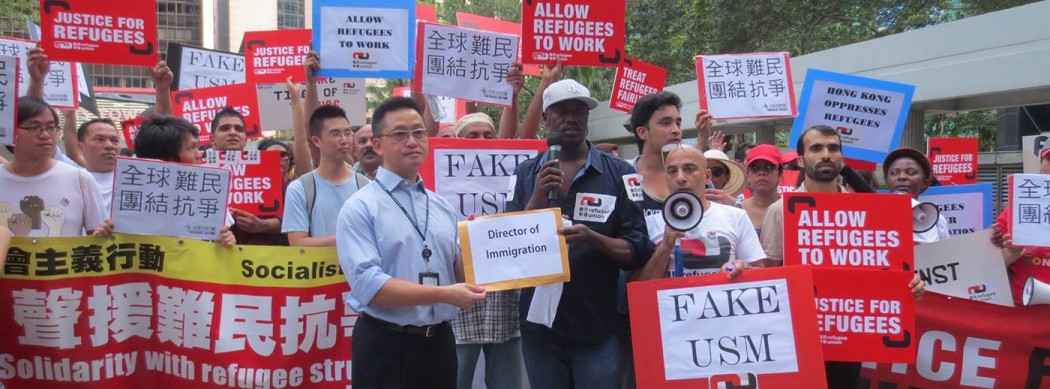Chief Executive Leung chun-ying has said that, if necessary, the government may quit a United Nations convention on torture to block “fake” refugees from coming to Hong Kong. Leung was speaking at a press conference on Wednesday following his 2016 Policy Address.
China is a signatory of the UN Convention against Torture and Other Cruel, Inhuman or Degrading Treatment or Punishment (UNCAT), meaning Hong Kong is bound by it as well. Over the years, the number of non-refoulement claims – suspected refugees asking not to be sent back to their home country – has risen to over 10,000 in Hong Kong. However, the screening process to review their claims has been slow.
Wednesday’s Policy Address stated: “The Government will conduct a comprehensive review of the strategy of handling non-refoulement claims, including a review of the Immigration Ordinance. We will expedite screening of claims to address various acute problems such as illegal immigration and overstaying.” The announcement follows a backlash in the local media against refugees in the city.

When asked by reporters whether Hong Kong will quit the UNCAT to speed up the process, Leung said: “We may do so if it is necessary.”
“We stress that we do not want any country to abuse Hong Kong’s relatively open immigration policy, and [we] do not want anyone to abuse the visa-free arrangement between us and their country… we must fix this loophole,” Leung added.
‘Careless answer’
In response, local NGOs have criticised Leung, stating that Hong Kong is not only bound by the UNCAT – which may be impossible to quit since China is the actual signatory – but is also liable under the International Covenant on Civil and Political Rights (ICCPR).
“Even if he can get rid of CAT, the ICCPR is always there for the court to ensure his administration to honour the obligation of no torture, no cruel, inhumane and degrading punishment or treatment, and non-refoulement,” said Law Yuk-kai, Director of Hong Kong Human Rights Monitor.
Law told HKFP that it cannot be changed unless the Basic Law is amended. “There’s no denounciation clause in the ICCPR, and the ICCPR is entrenched by Article 25 of the Basic Law… Moreover, the freedom from torture is an absolute right which is not derogable, nor can the right be reserved.”

Law said that Leung’s “careless answer” showed that “he does not not have knowledge in Hong Kong laws and international conventions, the ability to handle international affairs, and the responsibility to be a leader of a civilised society.”
“He does not have human rights in his mind, and ignores [the suggestions made by] the UN Committee Against Torture,” said Law. Last month, the UN Committee Against Torture expressed concern over the operation of a unified screening mechanism for non-refoulement claims.
On the slow screening process of non-refoulement claims, Law said the blame should be with the government as their unfair screening procedures had been repeatedly overturned by the Court of Final Appeal, causing a backlog. “If anyone is attracted to come to abuse our system’s lengthy time of waiting for processing, the government is the first to be blamed,” he added.
‘Disturbing precedent’
Justice Centre Hong Kong, a refugee rights advocacy group, wrote in a statement that withdrawing from an international human rights treaty would set a “disturbing precedent” for the future of human rights in Hong Kong.
“The timing of this comment, so closely after the Committee against Torture’s review of Hong Kong in November, sends the wrong message to the international community about Hong Kong being an open society and a global city,” the statement read.
“158 countries of 193 UN member states are party to the Convention against Torture. If Hong Kong were to withdraw, it would join the ranks of repressive regimes such as Zimbabwe, Central African Republic and North Korea. Fundamental human rights and freedoms must not be held hostage to politics of the day.”

A feasible proposal for a serious problem
There are, however, voices supporting Leung’s speech.
Dominic Lee Tsz-king, convenor of Alliance Demanding Repatriation of Refugees and a Liberal Party district councillor, told HKFP that he doubted if it was indeed impossible for Hong Kong to quit the UNCAT.
“China is a signatory of 1951 Refugee Convention, but Hong Kong only signed the lower level UNCAT in 1992… the Refugee Convention does not apply to Hong Kong under the One Country, Two Systems principle,” Lee said. “China can always review its refugee policy, the matter of conventions is foreign affairs and is a responsibility of the Central Government to handle for Hong Kong – it may be feasible to quit [the UNCAT through China].”
The government has accepted only ten claimant cases over the years, but Lee said that the slow screening process of refugees was not the government’s fault.
“It sounded like a student got zero marks for an exam, and told his mother that the examination system is not reasonable,” he said.
“Could it actually be that the Hong Kong system attracted many ‘fake’ refugees? We have subsidies [for refugees] without screening procedures, there is a lot of opportunities for black market work, and there’s some legal chambers specifically helping refugees to file lawsuits, apply for legal aid and file judicial reviews. The problem of ‘fake’ refugees in Hong Kong is very serious, it’s ridiculous to say our system is problematic.”

Refugees currently receive a housing allowance of HK$1,500 per month along with HK$1,430 for food and transport per month. Many live in slum-like conditions in the New Territories.
